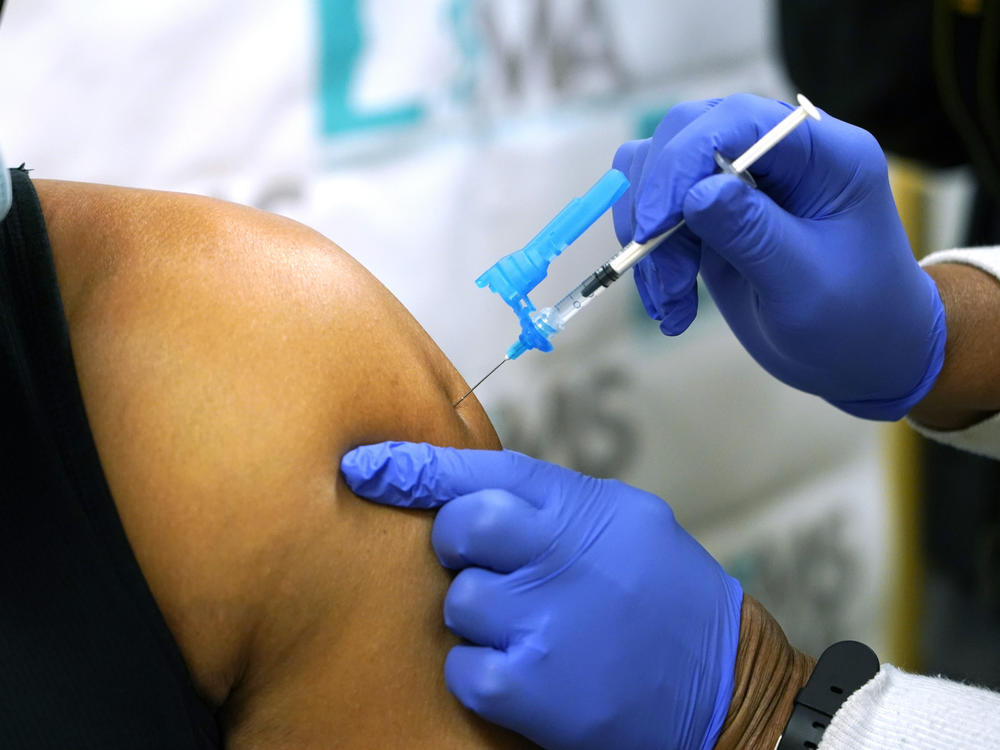Section Branding
Header Content
Some Vials Of COVID-19 Vaccine Contain Extra Doses, Expanding Supply, FDA Says
Primary Content
The Food and Drug Administration says that some of the vials of Pfizer-BioNTech COVID-19 vaccine being distributed throughout the U.S. contain extra doses and the agency is encouraging hospitals and clinics to use the additional shots to speed up the nationwide immunization campaign.
The agency issued the guidance Wednesday after health care workers reported throwing out the excess vaccine, fearing it would be against the rules to use it.
"At this time, given the public health emergency, FDA is advising that it is acceptable to use every full dose obtainable (the sixth, or possibly even a seventh) from each vial, pending resolution of the issue," the FDA wrote in a tweet.
As health care workers prepared for the vaccine's arrival, they expected to receive vials holding five doses. That left many surprised by the overfilled containers.
Inoculations began in the U.S. on Monday with health care workers and the elderly being the first in line to get it. For the medicine to be fully effective, each patient requires two injections three weeks apart.
Leading health experts say that even if all goes well, the vaccine will not be available to the general public until the end of March or beginning of April.
The Pfizer-BioNTech-developed drug is the only vaccine that has been authorized for emergency use by the FDA. Permission to use the additional portions means the limited supply could increase by up to 40%, Politico reported.
A vaccine developed by Moderna is expected to get emergency use authorization from the FDA as early as this week. Clinical data shows it is nearly as effective as the Pfizer injections.
Drugmakers typically overfill vaccine vials, anticipating spills and other waste, Politico explained.
"It's pretty unusual to have a full extra dose or more though — but it does seem to be there!" Erin Fox, a pharmacist at University of Utah who monitors drug shortages, told the news outlet.
However, because there are no preservatives in the vaccines, partial doses from separate vials shouldn't be combined. The agency is working with Pfizer to learn more about the issue and provide updates.
There are conflicting reports about when the U.S. is poised to receive another batch of the medicine from Pfizer. As NPR reported, "Although a Pfizer board member says the government declined to buy more doses beyond the initial 100 million agreed upon in July, Health and Human Services Secretary Alex Azar told PBS Newshour that this is inaccurate."
Meanwhile, The New York Times reported that a second allotment of the Pfizer-BioNTech vaccine may not be available to the U.S. until next June, given the combination of short supply and global demand.
Dr. Anthony Fauci, the nation's senior official for infectious diseases, told NPR this week that half of all Americans would need to be vaccinated before seeing an impact on the spread of the virus, and that 75% to 85% of the population would need to be vaccinated to create herd immunity.
He predicted the U.S. could begin to see early stages of herd immunity by late spring or summer.
Copyright 2020 NPR. To see more, visit https://www.npr.org.

